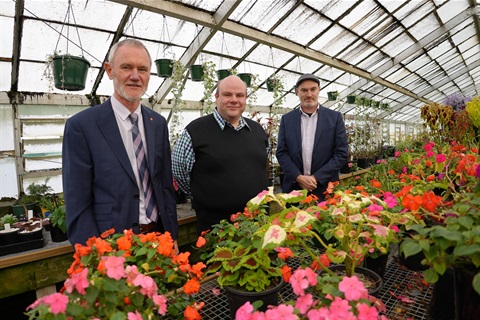Council and Chamber seed new greening partnership
Published on 09 May 2022

The City of Launceston and Launceston Chamber of Commerce are hopeful the seeds of success have been planted in a new 'Greening of Launceston' Memorandum of Understanding.
The Memorandum of Understanding seeks to enhance Launceston's central green spaces by increasing the number of street trees, plantings and arbour systems across the urban realm.
The MoU applies to Launceston's central activity area as well as precincts like Mowbray and Kings Meadows, with the second stage of the Launceston City Heart Project agreed as a priority project.
Other elements of the MoU include the development of an Urban Forest Plan to retain and significantly increase canopy cover across Launceston, to ensure new residential subdivisions are subject to high standards of greening, to consider the establishment of new community gardens, to work with environmental agencies on riverbank re-vegetation, and to explore opportunities to harvest stormwater for use in city green spaces.
Mayor Albert van Zetten said the Chamber and the Council both shared a vision for Launceston as a more vibrant, greener and dynamic city.
"The proposed MoU provides a framework for the two organisations to accelerate the greening of Launceston with agreed priorities, timeframes and actions," Mayor van Zetten said.
"A key priority project for the MoU will be the $17m second stage of the Launceston City Heart Project, which has already been part funded by the City of Launceston and the State Government; a project which seeks to redevelop St John and Paterson streets with quality street furniture, dynamic lighting, and more street trees and greenery.
"The Council is hopeful of seeing a Federal funding commitment of $8.6m towards this critical CBD enhancement project, which will improve liveability, encourage further private investment and make our city centre a more attractive place to live, work and play."
Launceston Chamber of Commerce President Andrew Pitt said both organisations were eager to see Launceston positioned as one of the great regional cities of the world.
"When you look at other leading cities around the world many of the most successful boast amazing gardens, incredible parks and beautiful tree-lined streets," Mr Pitt said.
"There's no doubt Launceston has some of that. But developing a collaborative, ambitious program of accelerated urban greening is about the closest thing to a silver bullet for a city's success that you can find.
"Green spaces enhance liveability, they attract people, and spark economic activity, which is why they are a critical consideration in CBD redevelopment projects like the second stage of the Launceston City Heart Project.
"In a similar way to food and gastronomy, ambitious urban greening cuts across economic, social and environmental outcomes in a way that provides great return on investment."